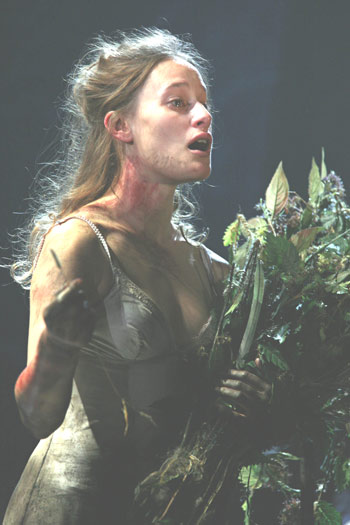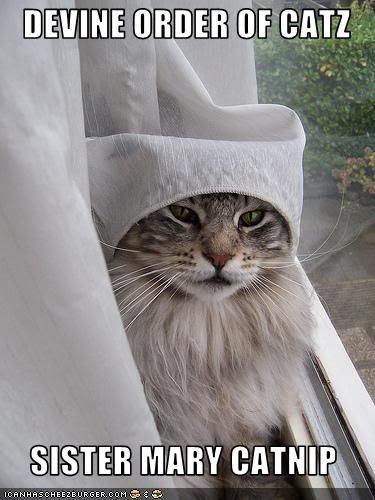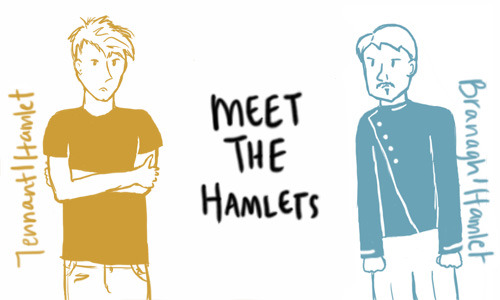I watched 2 versions of Hamlet (Kenneth Branagh and David Tennant or Royal Shakespeare Co.
) with
Anne and
Marina. I really agreed with what they shared, but there was a couple of things about the RSC version that I want to add.
Braking The 4th Wall
 |
| Hehe, I broke it! |
|
In the RSC with David Tennant they had a habit of braking the 4th wall. This is a performance technique where the actors actually speak to the audience. It was a very interesting way to do Shakespeare. Some of the soliloquies where done this why where they were talking directly to the audience (in which case, it is not really a soliloquy is the true sense.
This was a very interesting way to deliver the lines of Shakespeare. It was something I did not expect at all, so the first time it surprised me and I had to stop and ask myself "wait, is he talking to me?" Still, I think they had a legitimate motivation to have the lines said that way. In real life, no one really talks to themselves (I love talking to inanimate objects, but that is another issue entirely :) we talk to the people around us. I though it was especially good when Polonius turned and told us how strange Hamlet was acting when he asked for a speech from the players.
The modernization
Anne and Marina both talked about this a little. The RSC set the play in the 21st century with, specifically, modern fashions and technology. Both of these I believe had a similar effect as the 4th wall technique; they were a bit surprising at first and seemed a little out of place, but once you got used to it it added an interesting and beneficial element to the film.
The wardrobe
Familiar clothing was worn and right from the beginning you could tell that the characters were all upper-class. The men were all in suits and the queen was wearing a dress of very high fashion. This is something that would not be quite as obvious if you had everyone in period costumes, because you would have to be very familiar with history to spot the difference right off.
They also made use of the consume changes at scene brakes. The difference was clearly highlighted in the To be or not to be speech for Hamlet and when Ophelia go mad.
To be or not to be was spoken in a graphic tee. He was alone, in comfortable clothing with his hair undone from the gelled, formal look he had earlier. These all added to his crazy (besides the fact that David Tennant is great at acting like a mad man). This clear informality also added to the intimacy of the soliloquy and allowed him to ask the very personal, probing questions.

Ophelia has some great costumes. She starts out in formal dress as well, but when she goes mad you can tell right away. She emerges with only her underwear! Her hair is also loosed in the true sense of the word.

One thing I missed in the RSC version was a straight jacket for Ophelia. Though it was styled period fashion, you could tell that that is what they had her wear in the Kenneth Branagh version.
The technology

The RSC decided to farther modernize the film by using security cameras. I thought it was very effective in the opening sequence with the ghost encounter. You could not see the ghost in the shot, but you could tell that the characters could. This was very interesting and grabbed my attention right away. It was a great way to introduce a ghost. It was also used later when Hamlet gets crazy and Polonius and the King spy on him. I loved the part where Hamlet takes the camera down and says "now I am truly alone" before going into "to be or not to be". (This sequence was done in the Branagh version with one-way mirrors, which I thought was also phenomenal, but less modern of course.)

Hamlets handheld camera is another modern touch that added to the movie. He uses it more and more as he looses it more and more. The irony is that he uses it to document his spying on his uncle the king during the play that he has performed for that very cause. It is parallel to them spying on him through the security cameras.
Overall I loved the RSC version. It was more true to the theater and closer to what Shakespeare would have been like even though it was modernized. I think the choices to they made in the wardrobe and the technology were logical and creative. They were also effective in getting my attention. The only thing I missed was the very clean, professional and highly edited cinematography of a good film like the Branagh version. But RSC is supposed to be more theater, less movie. And I think that they pulled it off well.
I might be biased though, because you know how I love David Tennant :)
PS. I also found a post on Bardfilm about the Branagh movie. It talked about Ophelia's character and the theme of winter in the film. For example; where did she get the flowers in her bouquet and how did she drowned in the brook in the middle of winter?? If you are interested here's a link:
Bardfilm.



















